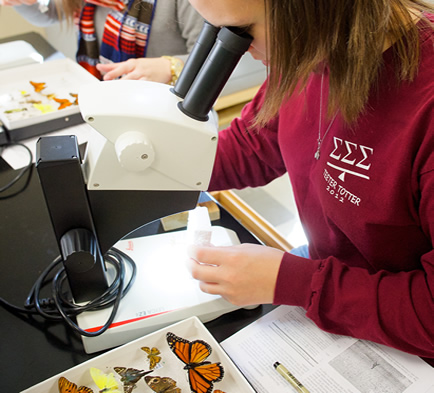Explore the Complexities of Life
If you are excited about the diversity of life, all the way from cells through ecosystems, then Biology may be the major for you! Our graduates are prepared for all types of life science careers, including research scientist, teacher, technician, and a wide variety of health-related professions. A student may opt for the broad-scope biology major or pursue a specialized concentration or pre-profesional trade to launch a path toward a specific field of study.

Available Majors, Minors, and Concentrations
The Biology program prepares students for meaningful vocations in the sciences, from the environment, to law enforcement, to research, education and health care. The Biology major is perfect for students looking for a broad understanding of the science of life, and our three concentrations allow students to tailor their study to their career goals and areas of interest. The Biology minor allows majors in other science fields to expand their knowledge, diversify their study and open greater career possibilities.
Major
Biology
Concentrations
Environmental Studies
Forensic Biology
Secondary Education
Minors
Biology
Environmental Science
Requirements
A major in biology includes
- 27 hours: Biology core
- 9-12 hours: Select biology electives
- 2 hours: Experiential learning
- 13 hours: Chemistry fundamentals
- 7 hours: Math fundamentals
- 4 hours: Physics
- 2 hours: Senior capstone
Environmental Studies (72 total hours)
The Environmental Studies concentration will allow students to immerse themselves in the environment, from research to hands-on work in the field. Newberry also has a dual-degree program with Duke University in Forestry and Environmental Management. Students who attend three years at Newberry receive a B.S. degree in Biology from Newberry upon successful completion of one year at Duke, and a master's degree from Duke after completing the specialized degree program.
Forensic Biology (76 total hours)
Since its development in the 1980s, forensic DNA analysis has exponentially impacted law enforcement’s ability to solve crimes. Perpetrators who would have otherwise eluded justice are apprehended daily by means of forensic science. The Forensic Biology concentration provides students the opportunity to meet federal educational requirements for DNA analysts and gain laboratory experience in DNA testing. The college has a strong working relationship with the South Carolina State Law Enforcement Division (SLED) laboratory and will continue to provide opportunities for valuable internships.
Secondary Education (105 total hours)
For students with aspirations of teaching the next generation, our department offers a prescribed program of courses to become certified as secondary-level biology teachers. This interdisciplinary curriculum requires the completion of both science and education courses.
Biology
The Biology minor requires 24 credit hours in Biology fundamentals, Chemistry, and 12 hours of Biology or Environmental Science electives.
Environmental Science
The Environmental Science minor requires 24 credit hours in Biology, Chemistry and Environmental Science fundamentals. An environmental science minor is not available to Biology majors.
Career Possibilities
- Biology Lab Technician
- Health Care Worker
- Pharmacist
- Biology Researcher
- High School Biology Teacher
- Physical Therapist
- Biotechnologist
- Medical Doctor
- Physician Assistant
- Botanist
- Microbiologist
- Science Writer or Artist
- Chiropractic
- Naturalist
- Veterinarian
- Forensic Biologist
- Occupational Therapist
- Zoo Assistant
Faculty

Lindsy Boateng
Chair, Department of Biology, Neuroscience, and Exercise Science; Associate Professor of Biology

Valarie Burnett
Associate Professor of Biology

Bret Clark
Dean of Sciences, Mathematics & Pre-Professional Studies; Professor of Biology

Charles N. Horn
Professor of Biology, Biology Program Coordinator


 Close
Close
